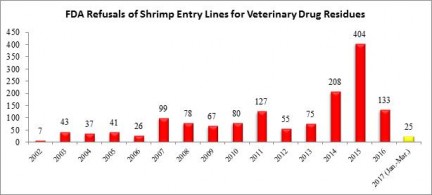This morning, the U.S. Food and Drug Administration’s (FDA) released information regarding entry line refusals for the month of March. In total, 7 of the 209 (3.3%) of the entry line refusals reported for last month were of shrimp for reasons related to banned antibiotics.
In addition, the FDA reported refusing another 7 entry lines of shrimp exported from China and Malaysia with a refusal code of “UNSAFE ADD,” indicating the detection of an unsafe food additive. With respect to shrimp imports, the “UNSAFE ADD” refusal code is occasionally used in conjunction with the refusal codes related to banned antibiotics. However, in each of the 7 refusals reported in the month of March, the “UNSAFE ADD” code was the only refusal code listed and it is unclear what unsafe food additive might have been detected sufficient to have the shrimp determined to be adulterated.
The seven shrimp entry lines refused by the FDA for banned antibiotics in March were from China, Hong Kong, and Vietnam and were reported by four different FDA districts:
- Minh Phu Seafood Corporation (Vietnam), a company that was added to Import Alert 16-124 for sulfamethoxazole in its shrimp on February 22, 2017 after its affiliate Minh Qui Seafood Co., Ltd. had been added to that Import Alert for sulfamethoxazole in its shrimp on July 22, 2016, had three entry lines refused for shrimp contaminated with veterinary drug residues, chloramphenicol, and because it appeared “to contain a poisonous or deleterious substance which may render” the shrimp “injurious to health” in the Southwest District and one entry line refused for shrimp contaminated with veterinary drug residues in the Los Angeles District;
- Minh Qui Seafood Co., Ltd. (Vietnam), a company that was added to Import Alert 16-124 for sulfamethoxazole in its shrimp on July 22, 2016 (later, its affiliate Minh Phu Seafood Corporation was also added to the same Import Alert for sulfamethoxazole in its shrimp on February 22, 2017), had one entry line refused for shrimp contaminated with veterinary drug residues in the New York District;
- Lee Fung Marine Products Trading Co. (Hong Kong), a company that is not currently listed on Import Alert 16-124, Import Alert 16-127, or Import Alert 16-129, had one entry line refused for shrimp contaminated with veterinary drug residues and unsafe additives in the New York District; and
- Dandong Shenghai Foodstuff Co Lt (China), a company that has not been exempted from Import Alert 16-131, had one entry line refused for breaded shrimp contaminated with veterinary drug residues and nitrofurans in the Atlanta District.
The seven shrimp entry lines refused by the FDA for “unsafe additives” in March were from China and Vietnam and were all reported by the Los Angeles District:
- Minh Phu Seafood Corporation (Vietnam), the same company added to Import Alert 16-124 for sulfamethoxazole in its shrimp on February 22, 2017 (after its affiliate Minh Qui Seafood Co., Ltd. was added to the Import Alert on July 22, 2016) and that had three other entry lines of shrimp reported as refused for shrimp because of banned antibiotics as well as being “poisonous”, had one additional entry line refused for shrimp found to have an “UNSAFE ADD” in the Los Angeles District; and
- Dalian Jinhui Marine Product Co., Ltd. (China), a company that has not been exempted from Import Alert 16-131, had six entry lines refused for shrimp found to have an “UNSAFE ADD” in the Los Angeles District.
As the Southern Shrimp Alliance explained in response to the FDA’s reporting of refusals in February, the Chinese and Hong Kong refusals may indicate that in response to the Import Alert on shrimp shipped to the United States from peninsular Malaysia, Chinese shrimp producers and exporters are exploring other ways to enter the U.S. market. These shipments continue to raise concerns regarding the use of banned antibiotics in shrimp aquaculture in China, the world’s largest producer of farmed shrimp.
The FDA’s reporting of repeated refusals of shrimp from Minh Phu Seafood and Minh Qui Seafood is particularly troubling.
The United States and Japan have reported the detection of banned antibiotics in shipments of shrimp from the Minh Phu Seafood Group over the last several years. The FDA has reported refusals of shrimp entry lines shipped by Minh Phu in each of the first three months of this year. In December of last year, Japan reported violations of its Food Sanitation Law for two separate shipments of shrimp from Minh Phu Seafood Corp. because enrofloxacin was detected in the shipments. In September and October of 2016, Japan reported that there were a total of three shipments of shrimp from Minh Phu Hau Giang Seafood Corp. found to have sulfadiazine. And just a few weeks ago, on March 23, 2017, the Canadian government placed Minh Qui Seafood Pte. on its “Mandatory Inspection List” for the detection of tetracyclines in its shipments to Canada.
Nevertheless, Minh Phu appears to have maintained its certification under the Global Aquaculture Alliance’s Best Aquaculture Practices program. This is remarkable. Since July of 2016, the FDA has listed one of the Minh Phu companies, Minh Qui Seafood, on an Import Alert for the antibiotic sulfamethoxazole and the company has not yet been able to get itself removed from that list. In fact, another Minh Phu company, Minh Phu Seafood was added in February of this year to the same Import Alert for the same reason. Now, in addition to sulfamethoxazole, the FDA is reporting refusing shrimp exported by Minh Phu for the presence of chloramphenicol, for unsafe additives, and for appearing to contain a poisonous or deleterious substance. Two other significant seafood importing markets – Japan and Canada – have also reported issues with shipments from Minh Phu companies. Yet, despite the repeated problems that have been detected with Minh Phu, there appears to be minimal demand from large purchasers of shrimp in the U.S. market that the problem be addressed.

